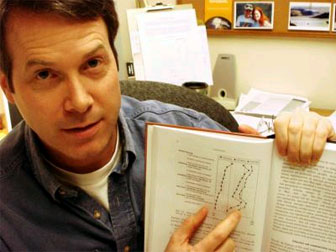Americans believe in global warming but don’t want to make changes
Americans believe in global warming but don’t want to make changes
mongabay.com
February 16, 2007
Most Americans believe global warming is real but view it as a distant threat according to comments by Anthony Leiserowitz, a professor of environmental studies at the University of Oregon, at the annual meeting of the American Association for the Advancement of Science in San Francisco.
Leiserowitz says that while Americans support renewable energy, higher fuel economy standards and international climate treaties, they are unwilling to pay for carbon taxes that would be most effective at reducing emissions of greenhouse gases.
His conclusions are based on research that examined the “risk perceptions, policy views and behavior of Americans in regards to global warming.”
Leiserowitz found that global warming is low on Americans’ list of concerns relative to issues like the War in Iraq, the economy, health care and education, and even other environmental issues, such as air and water pollution.
Still, when asked what images come to mind when they think of global warming, 61 percent of responses fell into one of four categories: melting Arctic ice, warmer temperatures, impacts of wildlife and wild lands, and the hole in the ozone layer.
|
Anthony Leiserowitz of the University of Oregon, photo by Jim Barlow |
“These responses help us understand the connotative meaning of global warming — and why Americans react the way they do,” Leiserowitz said. “These associations are to geographically or psychologically distant impacts, generic warming trends, or a completely different environmental problem. Thus it’s not too surprising that global warming remains a relatively low priority.
“One of the most important things that we found is what we didn’t find,” he added. “We found no references, no associations, of the impacts of climate change on either human health or extreme weather events. Yet these are, arguably, among the most important potential impacts, because, ultimately, the consequences are going hurt people.”
Leiserowitz found two particular groups with extreme viewpoints on global warming: alarmists, who have apocalyptic visions; and naysayers, who discount or deny the concept of climate change.
With regard to naysayers, Leiserowitz said “These people claim that there is no scientific evidence, blame global warming on media hype, or even hold dark conspiracy theories, such as scientists making up data to protect their job security. Naysayers are much more likely to be white, male, conservative, Republican, very religious, hold strongly individualistic or hierarchist values and to get their news and information from radio talk shows.”
His findings are detailed in a new book, “Creating a Climate for Change: Communicating Climate Change — Facilitating Social Change,” edited by Susanne Moser, a Research Scientist at the National Center for Atmospheric Research’s (NCAR) Institute for the Study of Society and Environment, Boulder, Colorado.
Related articles
Global warming tops list of Americans’ environmental concerns
Americans now rank climate change as the country’s most important environmental concern according to a survey released today by MIT. The poll found that almost three-quarters of the respondents felt the government should do more to deal with global warming and 60 percent agreed that there’s enough evidence to warrant some level of action. It also found that individuals were willing to contribute their own money to help prevent climate change – am average of $21 more per month on their electricity bill to “solve” global warming.
Americans believe hot weather, hurricanes linked to global warming
As first anniversary of Hurricane Katrina nears, a just-released Zogby poll shows that not only are Americans more convinced global warming is happening, they are also linking recent intense weather events like Hurricane Katrina and this summer’s heat wave and droughts to global warming.
This article is based on a news release from the University of Oregon.















